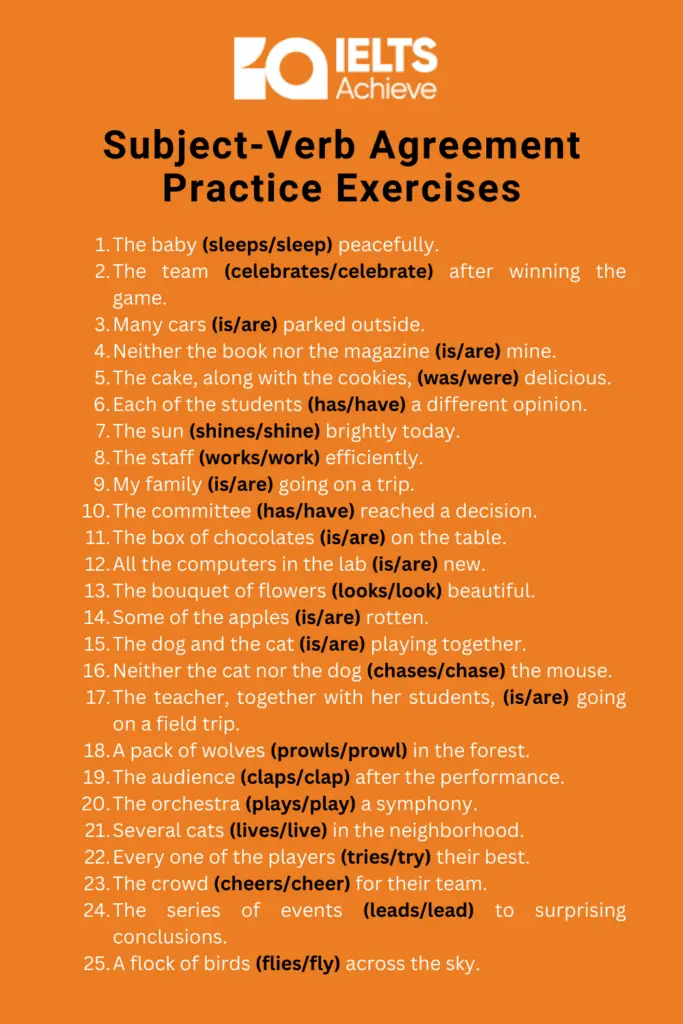Understanding subject-verb agreement is essential for mastering English grammar. Subject-verb agreement refers to the concept that the verb in a sentence must agree in number with the subject. In other words, singular subjects require singular verbs, while plural subjects require plural verbs. This article provides a comprehensive overview of subject-verb agreement rules, along with clear examples and 25 practice exercises to help you solidify your understanding. By the end of this article, you will have a strong foundation in subject-verb agreement and be better prepared to communicate effectively in English.
Singular subjects require singular verbs, while plural subjects require plural verbs.
Examples:
- A cat sleeps on the couch. (singular subject and verb)
- Cats sleep on the couch. (plural subject and verb)
When two subjects are connected by “and,” use a plural verb.
Examples:
- Sally and Tom are friends. (two subjects joined by “and,” plural verb)
- Apples and oranges are fruits. (two plural subjects joined by “and,” plural verb)
If a compound subject with “and” sounds singular, use a singular verb.
Examples:
- Peanut butter and jelly is a popular sandwich. (compound subject sounds singular, singular verb)
- Spaghetti and meatballs is a delicious dish. (compound subject sounds singular, singular verb)
The verb should agree with the main subject, not the nearest subject.
Examples:
- The group of students is going on a field trip. (main subject: group, singular verb)
- The list of items is on the table. (main subject: list, singular verb)
When subjects are connected by phrases like “as well as,” “along with,” “with,” “together with,” or “in addition to,” the verb should agree with the first subject.
Examples:
- The teacher, along with the students, is attending the workshop. (main subject: teacher, singular verb)
- The books, in addition to the magazines, are on the shelf. (main subject: books, plural verb)
When subjects are connected by “either-or,” “neither-nor,” “not only – but also,” or “or,” the verb should agree with the nearest subject.
Examples:
- Either the teacher or the students are responsible. (nearest subject: students, plural verb)
- Neither the students nor the teacher is available. (nearest subject: teacher, singular verb)
Singular verbs are used with “either,” “neither,” “none,” “everyone,” “someone,” “anyone,” “many a,” “more than one.”
Examples:
- None of the books is interesting. (singular verb)
- Everyone in the class has completed the assignment. (singular verb)
- Many a person has faced this challenge. (singular verb)
Subject-Verb Agreement Practice Exercises:
- The baby (sleeps/sleep) peacefully.
- The team (celebrates/celebrate) after winning the game.
- Many cars (is/are) parked outside.
- Neither the book nor the magazine (is/are) mine.
- The cake, along with the cookies, (was/were) delicious.
- Each of the students (has/have) a different opinion.
- The sun (shines/shine) brightly today.
- The staff (works/work) efficiently.
- My family (is/are) going on a trip.
- The committee (has/have) reached a decision.
- The box of chocolates (is/are) on the table.
- All the computers in the lab (is/are) new.
- The bouquet of flowers (looks/look) beautiful.
- Some of the apples (is/are) rotten.
- The dog and the cat (is/are) playing together.
- Neither the cat nor the dog (chases/chase) the mouse.
- The teacher, together with her students, (is/are) going on a field trip.
- A pack of wolves (prowls/prowl) in the forest.
- The audience (claps/clap) after the performance.
- The orchestra (plays/play) a symphony.
- Several cats (lives/live) in the neighborhood.
- Every one of the players (tries/try) their best.
- The crowd (cheers/cheer) for their team.
- The series of events (leads/lead) to surprising conclusions.
- A flock of birds (flies/fly) across the sky.
Subject-Verb Agreement Practice Exercises: Answers
- sleeps
- celebrates
- are
- is
- was
- has
- shines
- work
- is
- has
- is
- are
- looks
- are
- are
- chases
- is
- prowls
- claps
- plays
- live
- tries
- cheer
- leads
- fly
